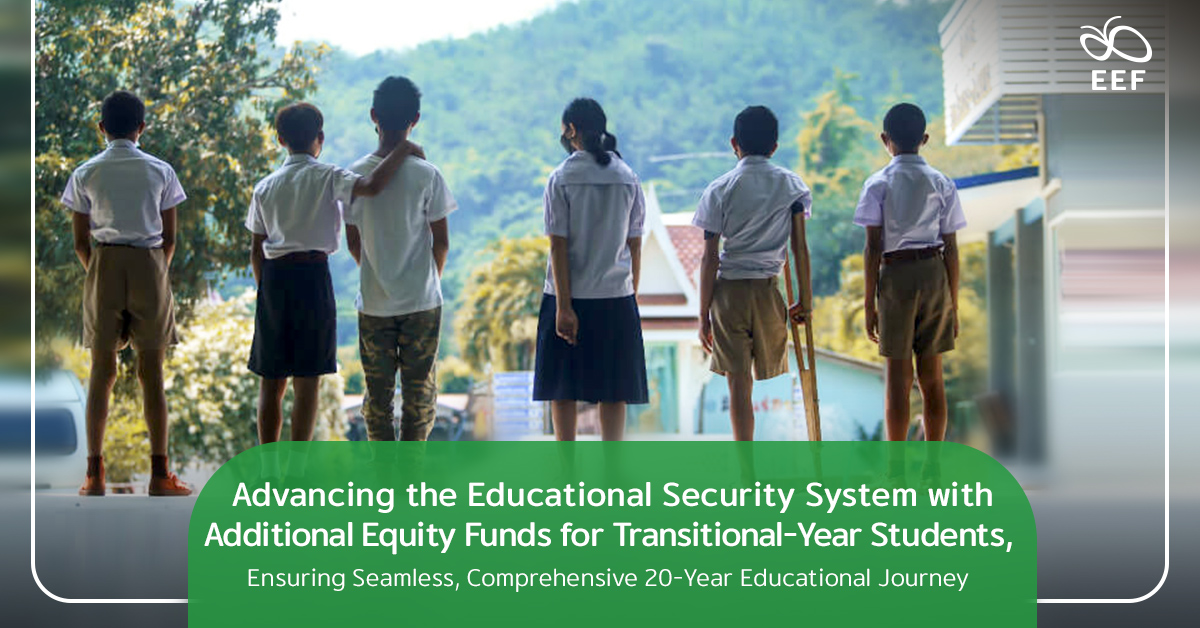
Founded in 2017, the Equitable Education Fund (EEF) Thailand stands dedicated to fostering equal educational opportunities. Its core mission revolves around ensuring a continuous and comprehensive 20-year educational journey for economically disadvantaged children and youth, commencing from early childhood education and extending seamlessly to higher education. Armed with a wealth of data garnered from annual surveys tracking millions of the most vulnerable students, the EEF joins hands with various public educational agencies and a university network, utilizing databases such as Conditional Cash Transfer (CCT) and Thai University Central Admission System (TCAS). This collaborative effort aims to provide a robust safety net for students pursuing higher education. Out of this partnership emerged the “Education Security System,” an innovative framework encompassing diverse non-repayable scholarship formats, assistance models tailored to available resources, and private sector resource mobilization.
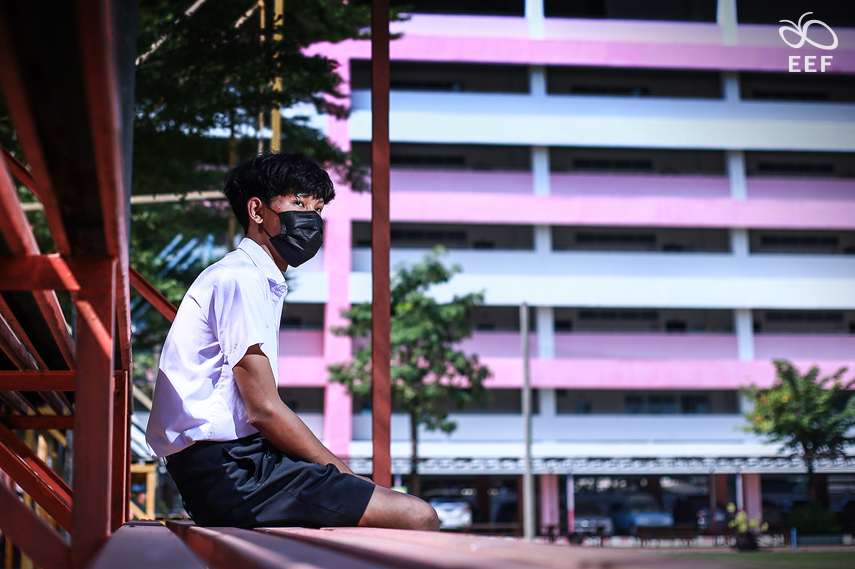
In 2023, the EEF has propelled this transformative collaboration to greater heights, further enhancing the seamless and holistic 20-year educational trajectory for economically disadvantaged students. This expansion, spanning right from upper secondary education and extending all the way up to higher education, involves strategic alliances with key educational management agencies. These include the Office of the Basic Education Commission (OBEC), the Department of Local Administration (DLA), the Border Patrol Police Headquarters (BPP), the National Office of Buddhism (NOB), and the Office of the Private Education Commission (OPEC) in secondary education. In tertiary education, partnerships have been forged with the Ministry of Higher Education, Science, Research, and Innovation (MHESI), the Secretariat of the Conference of University Presidents of Thailand (SET Pa.), and the Student Loan Fund (SLF). Together, these entities have allocated additional Equity Funds to support students in the most economically disadvantaged group. This strategic initiative seeks to eliminate barriers to education by alleviating financial burdens on students from economically challenged households, especially during critical transitional years. The overarching goal is to enhance access to higher education while tailoring developmental support to individual aptitudes and needs.
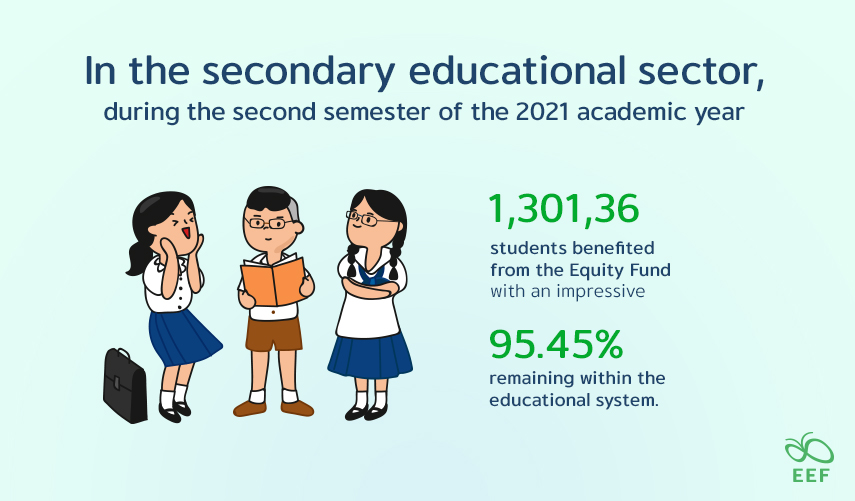
In the secondary educational sector, during the second semester of the 2021 academic year, a total of 1,301,366 students benefited from the Equity Fund, with an impressive 95.45% remaining within the educational system. However, a noteworthy 4.55% reportedly chose not to pursue further education, and within this group, a majority (4.04%) comprised students in Kindergarten 3, Grade 6, and Grade 9. An in-depth analysis of the 2022 education disparity situation unveiled that households of Equity Fund students faced an average monthly income reduction to 1,044 Thai Baht, potentially impacting livelihoods and hindering opportunities for higher education.
To ensure continuous educational opportunities for Equity Fund students during the transitional years, additional scholarships were earmarked for the second semester of the 2022 academic year. This strategic decision was grounded in trend data recorded through the CCT system, providing essential support to the targeted group’s educational aspirations at higher levels. The recipients — categorized into four levels, namely Kindergarten 3, Grade 6, Grade 9 in schools affiliated with the five public educational agencies, and Grade 12 in schools affiliated with the Border Patrol Police Headquarters — received increased funds of 800 Thai Baht per person. This infusion aimed to alleviate living expenses and educational costs.
Meanwhile, educational institutions played a pivotal role in raising awareness of the Equity Fund’s objectives, elucidating additional support details to students and parents. This encompassed expenses related to higher education readiness, application fees, and travel costs associated with pursuing education at higher levels. The measure was meticulously crafted to prevent dropouts among Equity Fund students during the transitional years and propel their progression to higher education levels by the 2024 academic year.
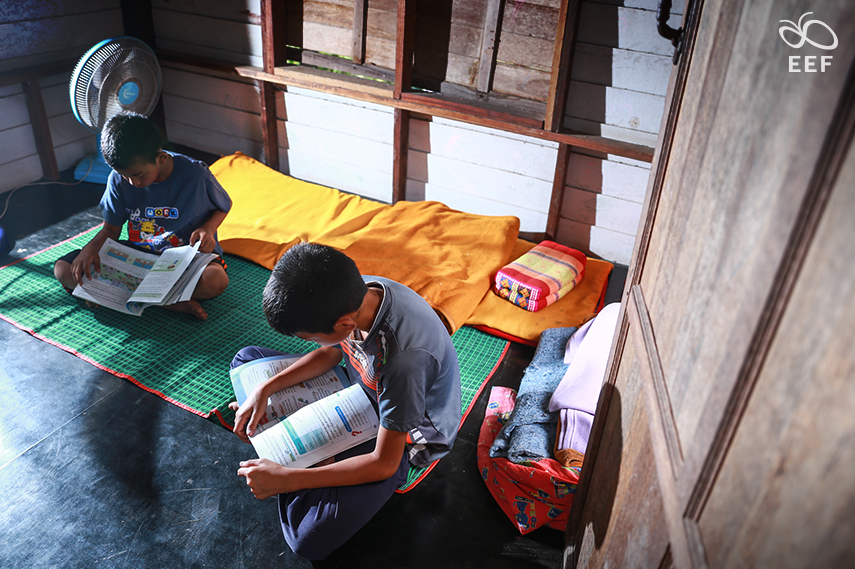
The EEF’s commitment reaches beyond secondary education to tackle the challenges faced by economically disadvantaged students in tertiary education. In a strategic collaboration with key relevant educational agencies, it spearheaded an initiative aimed at furthering the scope of the educational security system. This visionary endeavor specifically addresses students passing entrance exams but lacking tuition funds for higher education, ensuring a truly cohesive and all-inclusive 20-year educational progression for economically disadvantaged children and youth.
Findings on Grade 9 students in the 2019 academic year, who were previously recipients of the EEF’s Equity Funds and their affiliated institutions’ basic support funds, revealed that out of 175,977 students, 21,922 or only 12.46% secured the right to pursue higher education through TCAS in the 2023 academic year. Notably, the number of economically disadvantaged students in the poor and very poor groups confirming TCAS rights increased to 20,018, compared to the previous year. However, despite this, the percentage of students confirming their rights decreased by 13.52% in the 2023 academic year, prompting the need to further extend the educational security system. This underscores the importance of an educational security system as a safety net, preventing dropouts, instilling confidence, and fostering a path to successful academic completion and subsequent employment. This involved systematically tracking identified student groups, offering financial aid and various support measures, including part-time work and volunteerism, ensuring a holistic approach.
Data from the Bank of Thailand and the National Statistical Office underscore the significance of providing equal opportunities for economically disadvantaged students. Completing a bachelor’s degree doubles the average monthly income, emphasizing higher education as a “Giant Step” toward enhancing economic status and overall well-being for these youth. Despite this, the university enrollment rate mirrors the country’s human capital development challenges.
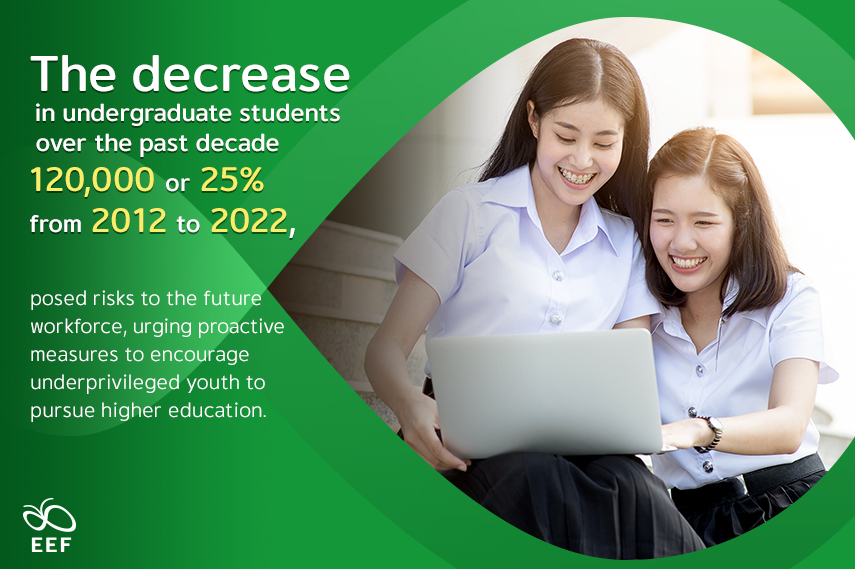
The decrease in undergraduate students over the past decade, 120,000 or 25% from 2012 to 2022, posed risks to the future workforce, urging proactive measures to encourage underprivileged youth to pursue higher education.
To address financial concerns, a cost-cutting initiative has been initiated. Application fees, ranging from 150 Thai Baht for a single program to 250 Thai Baht for three programs, escalate with more rounds and programs. Notably, deliberations are underway to potentially waive or eliminate application fees. Anticipated positive news may emerge from the forthcoming SET Pa. meeting in August, possibly waiving fees for the first two selections, with subsequent choices involving a supplementary fee. The overarching objective is to diminish educational disparities, foster expertise in their chosen fields, and empower them to lead fulfilling lives.
In retrospect, the EEF actively championed the collection of data on Equity Fund students not reported to continue education under their affiliated agencies. This initiative aimed to facilitate comprehensive assessments of at-risk students, involving timely searches, tracking, and necessary assistance. Endorsed by the Ministry of Education, this concerted effort materialized into a policy-driven equitable education project, backed by 14 collaborating organizations. The primary objective was unequivocal: reduce the number of children dropping out of the education system to zero.

Within the collaborative framework focusing on transitional-year students, the EEF proactively shared preliminary trend data with its affiliated educational agencies. This forward-thinking move seeks to empower educational institutions associated with them, providing databases for tracking educational trends in the initial semester of the 2023 academic year. It stands as a pivotal measure to proactively address the dropout risk within this actively engaged group, forming an integral component in the establishment of a sustained educational equality assurance system for the future.
In closing, the EEF’s unwavering commitment to eradicating educational disparities stands as a beacon of hope. Through innovative collaborations, it has paved the way for a seamless, comprehensive 20-year educational journey, breaking barriers for economically disadvantaged students. As we reflect on their transformative impact, the mission persists: to empower youth, instill confidence, and nurture a generation capable of leading fulfilling lives, transcending societal challenges, with the EEF’s legacy echoing in the pursuit of a future where education knows no bounds, marking a profound step towards a more equitable and empowered society, all through research, collaboration, and support for children, youth, and adults in need.

